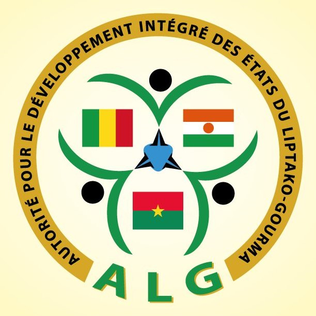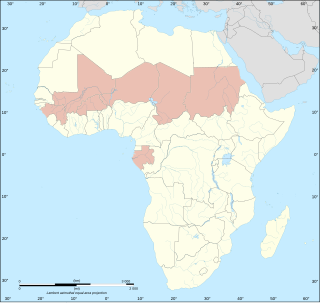
The Economic Community of West African States is a regional political and economic union of fifteen countries located in West Africa. Collectively, these countries comprise an area of 5,114,162 km2 (1,974,589 sq mi) and have an estimated population of over 424.34 million.

The Liptako–Gourma Authority is a regional organization seeking to develop the contiguous areas of Mali, Niger, and Burkina Faso.

G5 Sahel or G5S is an institutional framework for coordination of regional cooperation in development policies and security matters in west Africa. It was created on 16 February 2014 in Nouakchott, Mauritania, at a summit of five Sahel countries: Burkina Faso, Chad, Mali, Mauritania, and Niger. It adopted a convention of establishment on 19 December 2014, and is permanently seated in Mauritania. The coordination is organised on different levels. The military aspect is coordinated by the respective countries' Chiefs of Staff. The purpose of G5 Sahel was to strengthen the bond between economic development and security, and together battle the threat of jihadist organizations operating in the region.

Colonel Assimi Goïta is a Malian military officer who has been interim President of Mali since 28 May 2021. Goïta was the leader of the National Committee for the Salvation of the People, a military force that seized power from former president Ibrahim Boubacar Keïta in the 2020 Malian coup d'état. Goïta later seized power from Bah Ndaw in the 2021 Malian coup d'état and has since been declared interim president of Mali.
Events in the year 2021 in Mali.

Since 2015, the border area between Burkina Faso, Mali, and Niger has been a hotbed for jihadist forces originating from Mali. The insurgency has taken place in two distinct regions of Niger. In southwest, the Islamic State in the Greater Sahara and the Nusrat al-Islam have carried out attacks in the tri-border area with Burkina Faso and Mali. Meanwhile, in the southeast, the Islamic State in the West African Province has established control in parts of southern Niger.
The 2021 Malian coup d'état began on the night of 24 May 2021 when the Malian Army led by Vice President Assimi Goïta captured President Bah N'daw, Prime Minister Moctar Ouane and Minister of Defence Souleymane Doucouré. Assimi Goïta, the head of the junta that led the 2020 Malian coup d'état, announced that N'daw and Ouane were stripped of their powers and that new elections would be held in 2022. It is the country's third coup d'état in ten years, following the 2012 and 2020 military takeovers, with the latter having happened only nine months earlier.

An Islamist insurgency has been ongoing in the Sahel region of West Africa since the 2011 Arab Spring. In particular, the intensive conflict in the three countries of Mali, Niger and Burkina Faso has been referred to as the Sahel War.

A coup d'état took place in Burkina Faso on 30 September 2022, removing Interim President Paul-Henri Sandaogo Damiba over his alleged inability to deal with the country's Islamist insurgency. Damiba had come to power in a coup d'état eight months earlier. Captain Ibrahim Traoré took over as interim leader.
Events in the year 2023 in Mali.
On 26 July 2023, a coup d'état occurred in Niger when the country's presidential guard detained President Mohamed Bazoum, and Presidential Guard commander General Abdourahamane Tchiani proclaimed himself the leader of a new military junta, shortly after confirming the coup a success.

The Coup Belt is a modern geopolitical concept and neologism which emerged during the 2020s to describe the region of West Africa, Central Africa and the Sahel that is home to countries with a high prevalence of coups d'état. After the 2023 Nigerien coup, these countries formed a continuous chain stretching between the east and west coasts of Africa.
This article lists events from the year 2023 in Niger.

On 26 July 2023, a coup d'état occurred in Niger, during which the country's presidential guard removed and detained President Mohamed Bazoum. Subsequently, General Abdourahamane Tchiani, the Commander of the Presidential Guard, proclaimed himself the leader of the country and established the National Council for the Safeguard of the Homeland, after confirming the success of the coup.
The Volunteers for the Defense of Niger is a civilian militia force to combat a potential military intervention by ECOWAS. It is on the side of Abdourahamane Tchiani and the National Council for the Safeguard of the Homeland, the ruling military junta of Niger, during the 2023 Nigerien crisis.
The ECOWAS Standby Force (ESF) is a standby arrangement made up of military, police and civilian components and which is consistent with Chapter VIII of the United Nations Charter which provides for regional peace and security arrangements. A partial legal basis is given by Article 21 of the ECOWAS Protocol Relating to the Mechanism for Conflict Prevention, Management, Resolution, Peacekeeping and Security.
On 2 October 2023, 29 Nigerien soldiers were killed in the village of Tabatol, Niger. The soldiers were attacked by over 100 militants, who used IEDs and "kamikaze vehicles". The attack is the deadliest in the country since the coup d'état in July occurred.
Events in the year 2024 in Mali.
This article lists events from the year 2024 in Niger.









